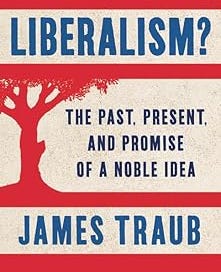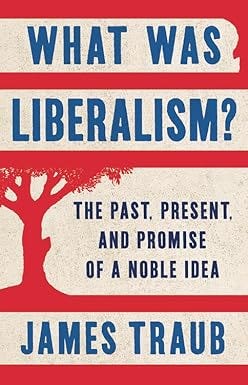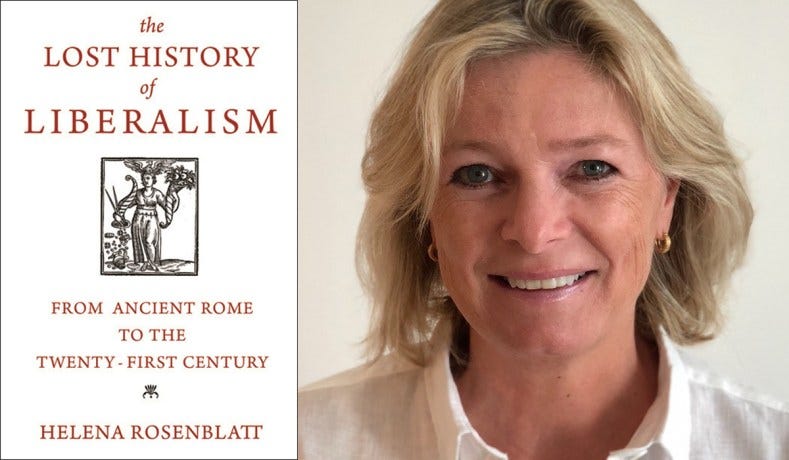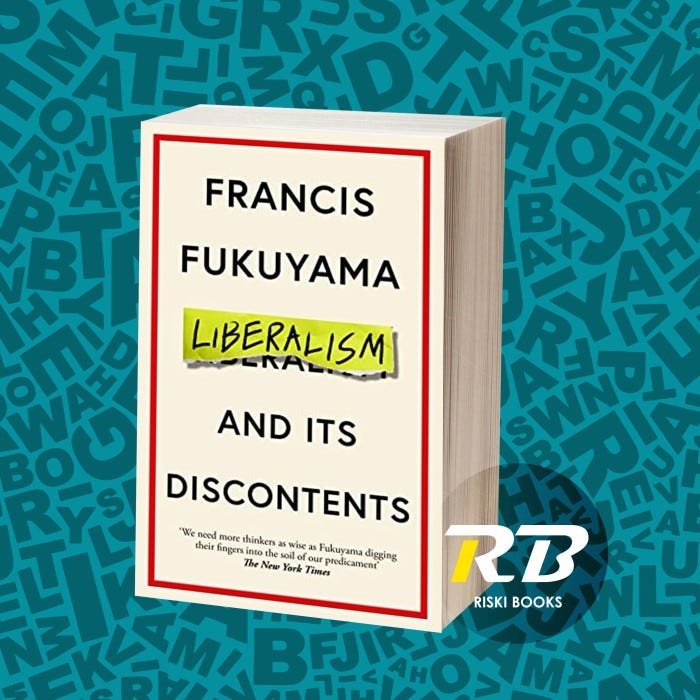In this second post on “Are We All Postliberals Now?,” I will introduce some recent works that I think nicely illustrate the more sober, appreciative, and reformist readings of “liberalism” that have been offered in recent years. I do so even if I prefer to speak of “constitutional democracy” because the term “liberalism” has been rendered so radioactive by its opponents. As someone who affirms what I think is among the most valuable insights of the conservative tradition, namely a presumption that existing institutions serve important purposes—including ones we don’t understand—and should not be needlessly disrupted, I am sympathetic toward reformist positions regarding what remains of our constitutional order. On the other hand, radical positions—such as the claim that “liberalism” had already failed some years ago and that our postliberal future is currently being shaped by the lawlessness and unconstitutional activities of the current administration—merit critical scrutiny.
Such appreciative and reformist readings of the liberal tradition can be an important resource for contemporary Catholics who are ready to think critically about the postliberalism that is being advanced as a Catholic position, and which seems to align Catholicism with those who are radically deconstructing American democracy and the postwar liberal order. These more sober and balanced discussions of liberalism can also help Catholics to appropriate and advance a socio-political vision that aligns with the whole biblical and Catholic tradition. Such a vision—which the Compendium of the Social Doctrine of the Church synthesizes as an integral and solidary Christian humanism—notably reflects the discernment of the magisterium since the Second World War. It allows Catholics to take a stand for the common good by taking what Benedict XVI called “the institutional path of charity,” by taking a stand for the common good precisely being solicitous for the institutions that give shape to our life in society.
I will introduce three of these recent works on liberalism, one by Helen Rosenblatt, one by James Traub, and one by Francis Fukuyama. I expect to come back to each of these works in the future, but to keep this post managable, I will keep these intruductions short.
James Traub’s What Was Liberalism? (2019)
James Traub’s What Was Liberalism? The Past, Present and Future of a Noble Idea was published in 2019. His chosen title clearly reflects the growing illiberalism in the years leading up to the book’s publication during the first Trump Administration.
Like Catholic postliberals, Traub’s narrative also recognizes the influence and limitations of enlightenment and modern political thinkers like Thomas Hobbes, John Locke, and John Stewart Mill. He does so, however, in a way that not only acknowledges the great achievement of the American founders in building upon sources and experiences tracing back to ancient Greece and Rome. Traub also the underappreciated fact that the American founders didn’t describe their system as “liberal.” He further recognizes the founder’s noble goal of building a political form through which citizens would not only govern themselves, but could also work to realize the aspiration to uphold the equality and rights of every person.
Traub further recognizes the grave threat of a postliberal future which most likely means the loss of self-government, the systematic violation and suppression of human rights, and the domination of the weak by the strong. He also considers what we might do to renew liberalism, a stance that aligns nicely with Catholic Social Doctrine.
The publisher’s blurb reads as follows:
Donald Trump is the first American president to regard liberal values with open contempt. He has company: the leaders of Italy, Hungary, Poland, and Turkey, among others, are also avowed illiberals. What happened? Why did liberalism lose the support it once enjoyed? In What Was Liberalism?, James Traub returns to the origins of liberalism, in the aftermath of the American and French revolutions and in the works of such great thinkers as John Stuart Mill and Isaiah Berlin.
Although the first liberals were deeply skeptical of majority rule, the liberal faith adapted, coming to encompass belief in not only individual rights and free markets, but also state action to provide basic goods. By the second half of the twentieth century, liberalism had become the national creed of the most powerful country in the world. But this consensus did not last. Liberalism is now widely regarded as an antiquated doctrine. What Was Liberalism? reviews the evolution of the liberal idea over more than two centuries for lessons on how it can rebuild its majoritarian foundations.
I have drawn upon Traub’s fine work to sketch out a more detailed discussion of liberalism here and here, including remarks on how it relates to the evolution of modern Catholic Social Doctrine. Much more could be said, which I may do in future posts. For those of us with limited free time to sit down and read, Traub’s book is also available in Audible format.
The Lost History of Liberalism
Helen Rosenblatt offers another recent work that I think allows for what accomplished scholars like Drew Christiansen, SJ has previously discussed as the robust appreciation of the liberal tradition that we find in modern Catholic Social Teaching.
The publishers blurb follows, with some comments illustrating why I think it provides a more helpful approach than we find in Deneen’s postliberalism.
The Lost History of Liberalism challenges our most basic assumptions about a political creed that has become a rallying cry - and a term of derision - in today's increasingly divided public square. Taking listeners from ancient Rome to today, Helena Rosenblatt traces the evolution of the words “liberal” and “liberalism,” revealing the heated debates that have taken place over their meaning.
In this timely and provocative book, Rosenblatt debunks the popular myth of liberalism as a uniquely Anglo-American tradition centered on individual rights. She reveals that it was the French Revolution that gave birth to liberalism and Germans who transformed it. Only in the mid-20th century did the concept become widely known in the United States—and then, as now, its meaning was hotly debated.
Liberals were originally moralists at heart. They believed in the power of religion to reform society, emphasized the sanctity of the family, and never spoke of rights without speaking of duties. It was only during the Cold War and America's growing world hegemony that liberalism was refashioned into an American ideology focused so strongly on individual freedoms.
This last paragraph touches upon several important points we might take from her study of how the word “liberal” has been used by writers in France, Britain, Germany and the United States since Ancient Rome. Her results highlight the deeply moral connotations of the word liberal and its cognates. Also noteworthy—given the attacks by Catholic postliberals like Deneen—is the surprising affinity of the liberal tradition to religion and to fostering family life.
The foundations for Rosenblatt’s study of liberalism are in the etymological roots in the Latin word liber, meaning “free” and “generous.” From this, liberalis or “liberal” means “befitting a free-born person,” with the noun form of liberalitas translated as “liberality” which carries the same connotations. The key literary source for this Roman useage is the statesman and orator Marcus Tullius Cicero (106-43 BC), who deeply influences the Western tradition, writing “eloquently about the importance of being liberal,” and thereby acting in a way befitting a free-born person. To act in a way that manifests liberalitas is to act in a noble and generous way, which is a life according to the virtues.
Most importantly, she emphasizes, this ancient and classical sense of being liberal meant being a free citizen as opposed to a slave. It also meant “being free of the arbitrary will of a master or the domination of any man.” his recent writings on the what is at stake in today’s struggle between autocracy and liberal democracy, Timothy Snyder emphasizes a similar point that today’s illiberal autocrats threaten a new submission to domination. The contemporary struggle for liberal or constitutional democracy is a fight for the ability to live together as free, generous and virtuous persons. Returning to Cicero, such freedom required “the rule of law and a republican constitution,” with “legal and political arrangements to ensure that the government focused on the common good, the res publica” (9). The contrast to what we are seeing unfold in today’s postliberal order could not be more stark.
For Cicero, freedom “also required citizens who practiced liberalitas, which referred to a noble and generous way of acting toward one’s fellow citizens.” Rosenblatt continues that the “opposite was selfishness, or what the Romans called “slavishness”—a way of thinking or acting that regarded only oneself, one’s profits, and one’s pleasures.” Needless to say, contemporary societies would benefit from much more of Cicero’s liberalitas much less of the selfishness of a world dominated by tyrants and oligarchs. Of course, Rosenblatt’s point is not that those who have written in favor of liberalitas have always exemplified these characteristics at the root of the tradition, but that a long word study shows that the ideal of liberalitas is foundational to the liberal tradition.
The whole book is full of valuable insights for a more sympathetic understanding of liberalism, a term that has largely been rendered an explicative through a long program of propaganda funded by aspiring oligarchs and aided at least indirectly by intellectuals, many of them claiming to represent Catholicism. Returning to the blurb, Rosenblatt writes:
Today, we still can’t seem to agree on liberalism’s meaning. In the United States, a “liberal” is someone who advocates big government, while in France, big government is contrary to “liberalism.” Political debates become befuddled because of semantic and conceptual confusion. The Lost History of Liberalism sets the record straight on a core tenet of today's political conversation and lays the foundations for a more constructive discussion about the future of liberal democracy.
A Genealogy of Liberalism as Unconstrained Freedom
I will mention one other aspect of Rosenblatt’s study that is of particular relevance to our postliberal moment. Given that her study documents how the long tradition of those advocating liberalitas has been driven by a moral concern for the common good that links duties with rights, she needs to explain how liberalism came to be attacked in recent decades as a doctrine of unconstrained freedom emphasizing rights detached from corresponding duties. Postliberals typically trace it back to the social contract theories of especially Thomas Hobbes and John Locke, along with the freedoms defended by John Stewart Mill. Rosenblatt argues that a particular understanding of liberalism—centered on rights but neglecting the classical ethical priority of the common good—came to be emphasized by influential intellectuals after the Second World War, under the pressures of the Cold War against Soviet Communism.
Throughout President Franklin Delano Roosevelt’s New Deal, the liberalism that emerged out of Progressive Era social reforms had been driven by an ethical concern over justice for workers, and with protecting them from the exploitation of what Roosevelt called “economic royalists.” FDR’s liberal vision for the postwar world was deeply influenced by a concern for justice and the common good, which could be seen in his famous “four freedoms,” namely “of speech,” “of religion,” “from want,” and “from fear.” The postwar programs that grew out of the New Deal, therefore, sought to build a strong middle class, providing the resources so greater numbers could live as free citizens, fully aligned with the moral concerns of the liberal tradition that human beings should live a virtuous freedom ordered to the common good.
Under the threat of Soviet totalitarianism during the the Cold War, however, several influential figures—including not only Hannah Arendt, Friedrich Hayek, and Reinhold Niebuhr but also Pope Pius XII, Jacques Maritain, and Fulton Sheen—had traced totalitarianism to the growth of government. One certainly needs a relatively large state to oppress the population, but subsequent history has shown that strong public institutions are integral to the common good. Some of these figures—like Hayek—were inspired especially to overthrow the New Deal model of a strong and active government in favor of the freedom of economic actors. These critical stances toward government led to a Cold War articulation of liberalism that centered in individual liberty and human rights, with Isaiah Berlin among the more notable advocates. They also provided the opportunity for a growing propaganda network funded by the business lobby to further denigrate government, to demonize the word “liberal” while paradoxically advocating freedom, and to pave the way for a new American oligarchy and the unraveling of the postwar liberal order.
Rosenblatt’s narrative of liberalism, therefore, offers a valuable resource for those Catholics who would like a more balanced and less ideologically driven engagement the liberal tradition such as we see in especially post conciliar Catholic Social Doctrine. Such readers will also appreciate the recent work of Francis Fukuyama.
Liberalism and Its Discontents by Francis Fukuyama (2022)
[Image from Riski Books]
Here’s the publisher’s blurb from Amazon.com:
A short book about the challenges to liberalism from the right and the left by the bestselling author of The Origins of Political Order.
Classical liberalism is in a state of crisis. Developed in the wake of Europe’s wars over religion and nationalism, liberalism is a system for governing diverse societies, which is grounded in fundamental principles of equality and the rule of law. It emphasizes the rights of individuals to pursue their own forms of happiness free from encroachment by government.
It’s no secret that liberalism didn’t always live up to its own ideals. In America, many people were denied equality before the law. Who counted as full human beings worthy of universal rights was contested for centuries, and only recently has this circle expanded to include women, African Americans, LGBTQ+ people, and others. Conservatives complain that liberalism empties the common life of meaning. As the renowned political philosopher Francis Fukuyama shows in Liberalism and Its Discontents, the principles of liberalism have also, in recent decades, been pushed to new extremes by both the right and the left: neoliberals made a cult of economic freedom, and progressives focused on identity over human universality as central to their political vision. The result, Fukuyama argues, has been a fracturing of our civil society and an increasing peril to our democracy.
In this short, clear account of our current political discontents, Fukuyama offers an essential defense of a revitalized liberalism for the twenty-first century.
This work is valuable but deals with the situation as of 2022, a time when Fukuyama was encouraging the Republican Party to return from the radical extremes to a more center-right position supporting democracy. Since that ship has long since sailed, his recent discussion of The Good Fight Podcast with Yascha Mounk “Francis Fukuyama on Donald Trump at Home and Abroad” can serve as a bridge to his views on the contemporary situation.
A few excerpts from the transcript follow below, starting with Fukuyama’s response to Mounk’s question about what responses should be taken by the various players following the various actions of the Trump administration in disdain of not just norms of our formerly liberal democracy, but of laws and the constitutional order itself.
Fukuyama: I think right now, the main action is going to be in the courts and in all of these lawsuits against the government. The Democrats have not been vocal enough in simply explaining to the American people and to their own constituents what’s wrong with this authoritarian impulse. I think they need to do that. I’m not sure that demonstrations and the kind of stuff that happened in 2017 is the best strategy at the moment, because I think you have to have much more vivid violations of the law before that becomes necessary. But I think the time will come when there’s a court order to do something that is simply ignored , then I think people out in the streets may actually be quite critical. One of Trump’s allies basically said, we can get away with this because there hasn't been that much complaining. We need to have a lot of prominent Democrats complaining. That’s one thing. [WFM Note: this is already occurring, although not yet against Supreme Court rulings. Note also: there are already marches in cities across the country but they are not getting much press.]
The other thing really has to do with the longer term, and this is something I’m trying to do in this group that I’ve got called Reform for Results. The Democrats have to have a positive alternative platform that they can rally around in 2026 and in 2028. My own preference is that it should have to do with a greater ability to build things in the United States. Other people have been talking about this, like Ezra Klein of the New York Times. But it’s really important. I think one of the great frustrations with modern liberal democracy and with liberalism in general is that we've created this procedural monster that has piled layer after layer of procedures on the ability of a democratic public to actually make things, to make decisions and to do things. We simply don’t build.
I think the Democrats need to say, if we come to power, we want to build back better, but we know that there are a lot of obstacles in the way of doing this, so we really have to do serious permitting reform. We've got to get rid of or seriously modify NEPA, the National Environmental Protection Act, as that is one of the big breaks on being able to actually do things. It’s going to mean going up against a lot of environmental lobbyists who really don’t want things to change. And it’s going to require a reform of the bureaucracy. I think actually there’s a big opportunity that’s been created by DOGE. People are going to see why you need a bureaucracy. But I think the Democrats have to accept the premise that the old system wasn’t working.
I have a very specific view of what the problem is. It really has to do with the overregulation of the bureaucracy itself, so you need to deregulate the bureaucracy and free it from a lot of these ridiculous rules that make it impossible to make decisions and to actually implement policies. I think that there’s actually a huge opportunity for the Democrats to rally around an agenda for the future that will not simply be restoring the status quo that existed before the 2024 election. One of the ironies of modern liberalism is that people on the left—progressives—want the government to do stuff but they’ve also made it nearly impossible for the government to actually carry out that promise because of proceduralism. Rethinking that is going to be critical to the political success of an opposition in the future.
Mounk: To me that speaks to a larger set of things I’ve been thinking about. It feels like the old political order is falling apart at the moment—or perhaps being destroyed with a sledgehammer, if you prefer to put it that way. I strongly oppose the vision—insofar as one exists, and insofar as it’s coherent—that the administration seems to have of a new order that they want to put in its place. That makes it tempting to think that an effective way to respond will be to just say no to everything. There are many things that we should say no to, for sure. But like you, my hunch is that what we need is a new counter-vision. Rather than saying, we want to make sure that the old order is preserved, we need a vision of how to build a better future that is more coherent and that would be more attractive to people and that could better deliver for people.
Now, I agree with you that one important part of that vision is to reestablish the ability of governments and societies to actually build. Marc Dunkelman has a good new book about that. Why is it that we can’t build enough housing in big metropolitan areas of the United States to allow people to participate in the economic opportunities that those urban areas offer? Why is it that we can’t have high-speed rail in the United States, like a track from Los Angeles to San Francisco?
In what other areas do you think we have to make a new offer or rethink how to build the new order?
Fukuyama: It’s easy to blame the political right, which wants to destroy the bureaucracy. But a lot of the problems in the bureaucracy were actually created by progressives. For example, we have in this country private attorneys general, where the state does not enforce its own laws. We leave it up to individual citizens—no other modern democracy does this. Dunkelman describes this as a Jeffersonian effort to push power down to an individual level so that people can protect themselves rather than relying on the state, because it comes out of a deep distrust of the state. But what it means is that all forty million citizens of California can sue any project they want anonymously, with no statute of limitations. That’s the reason why high speed rail is not being built in California. Every kilometer of track is being sued by somebody in California.
A lot of this is not being done for environmental reasons. It’s simply, I don’t want my neighborhood disrupted by a train going through here. I think it requires self-reflection on the part of people on the left. They have created a lot of these problems for themselves. Unless you reverse some of these institutional structures that exist, you’re actually not going to be able to build back better. The Biden administration wanted to do this with the CHIPS Act and in the Infrastructure Act that they passed with bipartisan support, but they didn’t proceed with an effort to streamline the permitting process or to streamline the bureaucracy. I think unless you do those kinds of major overhauls, you’re really not going to be able to accomplish any kind of ambitious aim.
Mounk: Any predictions about what the world will look like when we next convene for this conversation in a month or two?
Fukuyama: Well, given the current trend, I think it’s going to look worse. It’s hard to know exactly in what way. I think we're in a situation where things have to get worse before they get better, because otherwise you’re not going to have a political consensus in favor of reversing course and doing things differently.
If I understand him correctly, Deneen would say these reformists are all wrong because liberalism is fatally flawed and has already failed. In future posts, I will continue to engage critically with influential Catholic thinkers who have advanced alternatives to the “integral and solidary humanism” of Catholic Social Doctrine, especially the various figures associated with postliberalism. More importantly, I hope to illustrate how Catholics can have a more balanced appreciation for the liberal tradition and constitutional governance. Even more importantly, I hope to foster the realization of a new social Catholicism, where Catholics take what Benedict XVI calls the institutional and political path of Charity, to bring healing and hope to a nation and world facing the threat of a dystopian future.







